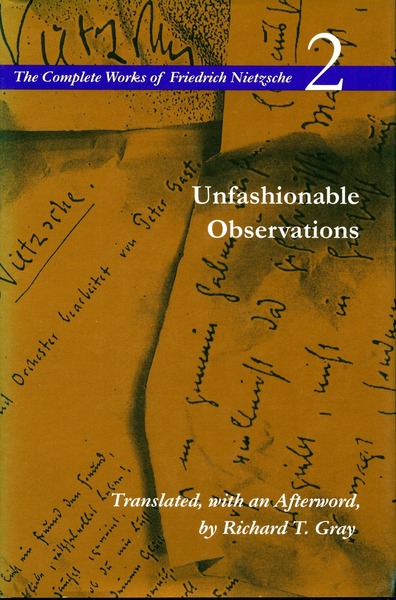The essence of the scholarly person...is marked by a genuine paradox: he behaves like the proudest idler upon whom fortune ever smiled, as if existence were not something hopeless and questionable, but rather a firm possession guaranteed to last forever. He sees nothing wrong in wasting one's life with questions whose answers could be important to someone already certain of eternal life. Everywhere around this heir to a few meagre hours there yawn the most terrifying abysses; at every step he should be reminded to ask: Why and to what purpose? Whither am I going? Whence do I come? But his soul is set aglow at the thought of counting the filaments of a flower or of cracking open the stones along the path, and he sinks the full weight of his attention, joy, energy, and desire into this labor.
Having myself foresworn academia--and what has been harder, foreswearing being an independent scholar doing the sort of research that academics do (though these days, mostly in what passes as their free time)--to pursue my studies where they lead and to do my own creative work, I enjoy Nietzsche's bold words. Though in calm moments I have to admit that scholarship too is of great value--or can be. It can exhibit the scientific spirit of discovery. It can be creative. And it can be helpfully pedagogic. Of course, often it's not--it is churned out to fit the demands of "publish or perish"--and almost always is crafted within the very narrow confines of what's currently considered acceptable academic opinion. (Which often requires willfully misunderstanding texts from other eras and contexts.)
Apropos of "publish or perish", Nietzsche's next words are prescient:
Now, this living paradox, this scholarly person, has recently begun in Germany to work at such a frantic pace that one must imagine scholarship as a factory in which for every delay of mere minutes the scholarly laborer is punished. Nowadays he labors as hard as the fourth estate, the slaves; he labors, his studies are no longer a calling but an affliction, he looks neither to left nor to right and passes through all the matters of life, even through those that are questionable in nature, with that half-attention or with that odious need for rest and recreation characteristic of the exhausted laborer.
(Unfashionable Observations, p. 46, Stanford edition of The Complete Works of Friedrich Nietzsche, v. 2)
P. S. (Feb. 19):
Found the following a little further on in my reading (in "The Utility and Liability of History for Life"):
To those who tirelessly mouth the modern cries to battle and to sacrifice, "Division of labor!" "In rank and file!," we have to say clearly and bluntly: if you want to further scholarship as quickly as possible, just as the hen that you artificially force to lay eggs as quickly as possible also perishes. Granted, scholarship has been furthered at an astonishingly quick pace in the last decades, but just look at the scholars, the exhausted hens. They are truly not "harmonious" natures: they can only cackle more than ever because they are laying eggs more frequently. To be sure, the eggs have kept getting smaller (although the books have only gotten bigger).

No comments:
Post a Comment